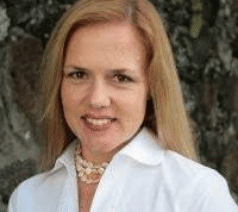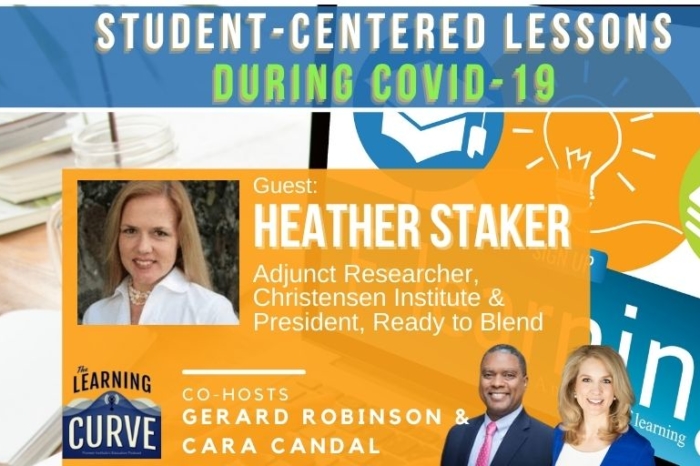Blended Learning Expert Heather Staker on Student-Centered Lessons During COVID-19
This week on “The Learning Curve,” Gerard and Cara talk with Heather Staker, founder and president of Ready to Blend. They discuss her work with the late Harvard Professor Clayton Christensen and Michael Horn on disruptive innovation and schooling, as well as her book, Blended: Using Disruptive Innovation to Improve Schools, and her recent publication, Developing a student-centered workforce through micro-credentials. They review the K-12 American public education system’s response to students’ instructional needs before and during COVID-19, the benefits and challenges of digital schooling that have come to light as a result, and the dangers of returning to the pre-pandemic status quo. They talk about some lessons drawn from other countries on digital and blended learning for American policymakers and educators. Staker also explains the benefits of diverse approaches to content mastery, including one-on-one mentoring, and opportunities for students to work both independently and collaboratively.
Stories of the Week: Declines in science scores from the 2019 administration of the National Assessment of Educational Progress, especially pronounced among lower-performing students, could point to struggles with reading comprehension. In Illinois, Governor Pritzker is threatening to significantly reduce state tax incentives for donations to the ‘Invest in Kids’ tax credit scholarship program, which has helped 22,000 low-income children attend private schools.
The next episode will air on Wednesday, June 9th, 2021 at 12 pm ET with guest, Dr. Glenn Loury, the Merton P. Stoltz Professor of the Social Sciences in the Department of Economics at Brown University.
Guest:
 Heather Staker is the founder and president of Ready to Blend. She is co-author of the Amazon bestseller Blended: Using Disruptive Innovation to Improve Schools, as well as The Blended Workbook and the popular report How to Create Higher Performing, Happier Classrooms in Seven Moves: A Playbook for Teachers. Her latest publication is Developing a student-centered workforce through micro-credentials, published by the Christensen Institute. Heather has been a featured presenter in hundreds of radio, television, and live events worldwide and in legislative hearings in the United States as a spokesperson for student-centered learning. As the founder of Ready to Blend, Heather leads a team of 150 facilitators in the United States, Middle East, and South America who have been certified to deliver blended-learning workshops to their teachers. Prior to this role, Heather was a senior research fellow for the Clayton Christensen Institute for Disruptive Innovation and a strategy consultant for McKinsey & Company. She served for one year as the student member of the California State Board of Education during Governor Pete Wilson’s administration, taught U.S. history as a teaching fellow at Harvard College, founded a co-op preschool, and marketed Oil of Olay for Proctor & Gamble. She holds a BA magna cum laude in government from Harvard University and an MBA with distinction from the Harvard Business School. She is the mother of five children and lives in Austin, Texas.
Heather Staker is the founder and president of Ready to Blend. She is co-author of the Amazon bestseller Blended: Using Disruptive Innovation to Improve Schools, as well as The Blended Workbook and the popular report How to Create Higher Performing, Happier Classrooms in Seven Moves: A Playbook for Teachers. Her latest publication is Developing a student-centered workforce through micro-credentials, published by the Christensen Institute. Heather has been a featured presenter in hundreds of radio, television, and live events worldwide and in legislative hearings in the United States as a spokesperson for student-centered learning. As the founder of Ready to Blend, Heather leads a team of 150 facilitators in the United States, Middle East, and South America who have been certified to deliver blended-learning workshops to their teachers. Prior to this role, Heather was a senior research fellow for the Clayton Christensen Institute for Disruptive Innovation and a strategy consultant for McKinsey & Company. She served for one year as the student member of the California State Board of Education during Governor Pete Wilson’s administration, taught U.S. history as a teaching fellow at Harvard College, founded a co-op preschool, and marketed Oil of Olay for Proctor & Gamble. She holds a BA magna cum laude in government from Harvard University and an MBA with distinction from the Harvard Business School. She is the mother of five children and lives in Austin, Texas.
Tweet of the Week:
Let us always remember the brave men and women who have given the ultimate sacrifice to protect our fundamental rights. pic.twitter.com/4OMJWHLlkY
— Foundation Against Intolerance & Racism (FAIR) (@fairforall_org) May 31, 2021
News Links:
NAEP Science Scores Down for Fourth-Graders, Flat for Older Students; Are Reading Challenges to Blame?
IL school choice advocates push to keep tax credit scholarship program alive
Get new episodes of The Learning Curve in your inbox!
Recent Episodes:











